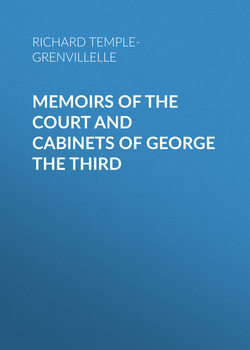Memoirs of the Court and Cabinets of George the Third

Реклама. ООО «ЛитРес», ИНН: 7719571260.
Оглавление
Richard Temple-Grenvillelle. Memoirs of the Court and Cabinets of George the Third
1788
1789
1790
1791
1792
1793
1794
1795
1796
1797
1798
1799
Отрывок из книги
DEATH OF THE SPEAKER – MR. GRENVILLE ELECTED IN HIS PLACE – COMMITTEE ON THE REGENCY – THE HOUSEHOLD BILL – CONDUCT OF THE PRINCES – ADDRESS TO THE PRINCE OF WALES FROM THE IRISH PARLIAMENT – RECOVERY OF THE KING – DECISIVE MEASURES OF LORD BUCKINGHAM – IRISH PROMOTIONS AND CREATIONS – DISSENSIONS IN THE ROYAL FAMILY – MR. GRENVILLE APPOINTED SECRETARY OF STATE – MR. ADDINGTON ELECTED SPEAKER – LORD BUCKINGHAM RESIGNS THE GOVERNMENT OF IRELAND.
The one absorbing subject which for the last few weeks had engrossed the public mind, almost to the exclusion of every other consideration, kept the Parliament sitting close up to Christmas-day, in the year just expired. On the 23rd of December, a resolution, vigorously opposed by Lord North as instituting a fiction in lieu of the royal authority, was adopted, empowering the Chancellor to affix the Great Seal to such Bill of Limitations as might be necessary to restrict the power of the future Regent; but Ministers had no sooner succeeded in carrying their object to this important stage, than a new impediment presented itself. On the 2nd of January, 1789, Mr. Cornwall, Speaker of the House of Commons, died. It was immediately decided that Mr. Grenville should be proposed to succeed him. On all accounts, it was indispensable to hasten this arrangement, as the functions of the Commons were unavoidably suspended in the interim. A serious obstacle arose from the informality of the proceeding, the sanction of the royal approbation being necessary, according to custom, upon the nomination of a new Speaker. The elastic character of the Constitution, however, although not providing direct remedies for such special cases, admits of adaptation to the most unforeseen exigencies; and so urgent was the pressure of affairs at this agitating juncture, that the irregularity was passed over by the tacit consent of all parties.
.....
In these poised and melodious sentences (said to have been written by Burke) may be recognized the policy of the master spirit that raised the storm which was to overwhelm Ministers. When the moment came, however, at which it should have burst – Pitt's motion for the Address – Fox was absent. "Fox is gone to Bath," says Mr. Grenville. "Whether he is very ill, as some say, or wants to shirk the discussion about Mrs. Fitzherbert, as others assert, I know not."
This business of Mrs. Fitzherbert, of which we hear something in these letters, was suspended like a sword over the heads of the royal Opposition; and whenever it threatened to descend, they endeavoured to escape from it by avoiding the discussion, or to avert it by abating their violence. The rumour, however, which ascribed Fox's absence on this occasion to that cause was certainly unfounded. On the 19th of January, he made his motion for limiting the continuance of the restrictions; and on the 26th he was ill at Bath, where he remained for some weeks in a precarious state of health. His loss was severely felt by his party. Ministers were triumphant in both Houses. The incidental shocks they experienced from the vibrations of that class of persons designated by Mr. Grenville as "conscientious friends," and from the defection of the rats, had been completely recovered in the final majorities of Lords and Commons; and although Fox may not have thought it prudent on some occasions to enhance the inevitable defeat of the Prince's followers by assisting at their discomfiture, it is unlikely that even the dread of a debate on Mrs. Fitzherbert would have kept him away at this critical juncture.
.....